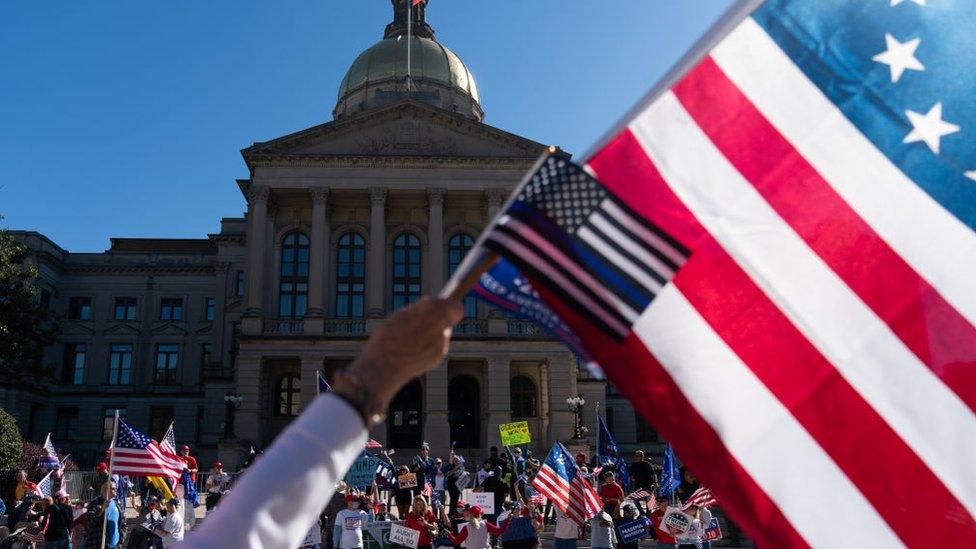Where does the Republican Party go after Trump?
- Published
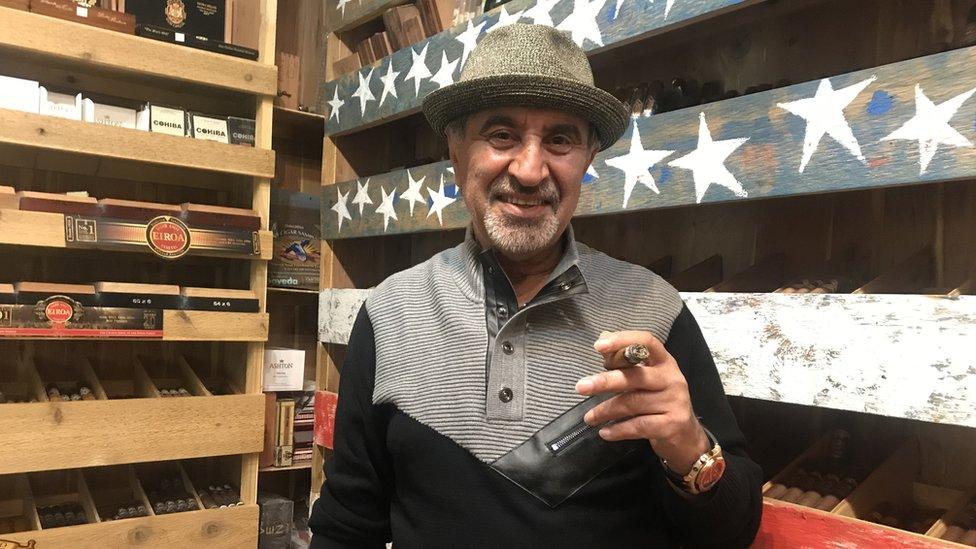
Cigar lounge owner Hassan Dakhteh hopes Trump will run in 2024
Donald Trump may have lost the election but he won a record number of votes, and tightened his grip on states like Ohio. So what can Ohio tell us about the Republican Party's future?
Powell, a suburb of the capital Columbus, has a charming and old-worldly feel.
Its picturesque neighbourhoods with big houses and rolling lawns reinforce the much romanticised pop culture images of the ideal American suburban life. The downtown market is lined with small cafes, handicraft shops, ice-cream parlours and wine stores.
President Trump won this county and, though the election is long over, many shops and businesses still have 'Trump-Pence 2020' campaign signs staked in their lawns.
Among them is a cigar shop called Stogies where a 'TRUMP 2020' banner is the centrepiece, flanking photos of Groucho Marx and Winston Churchill - celebrities of a bygone era - holding lit cigars.
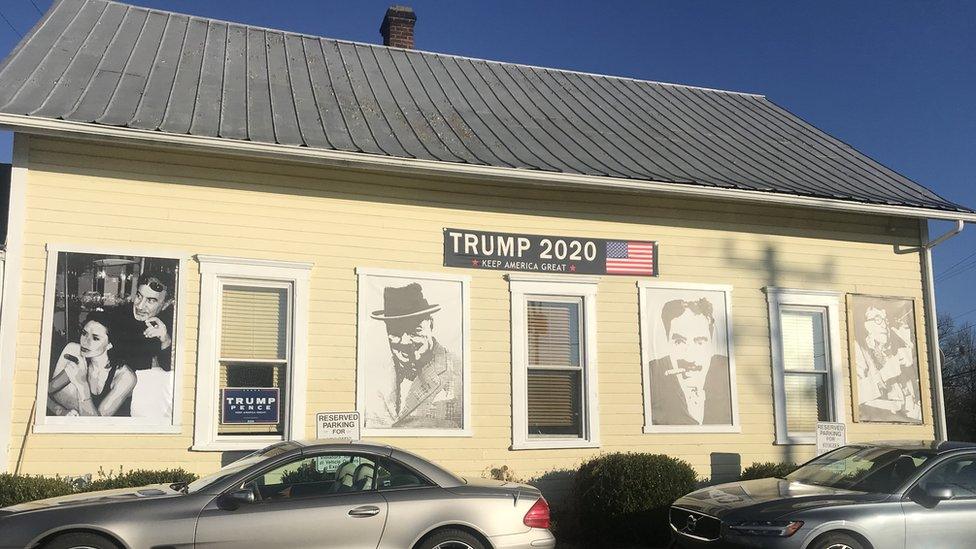
Concentric rings of smoke fill this cosy lounge, which used to be a church in the early 1900s. There is a group of men inside seated on sofas, all smoking cigars. President Trump looks down on them from an autographed photo.
They are all Trump supporters and part of the electorate that gave him a decisive victory in Ohio. Mostly in their 50s and 60s, they're college educated professionals and businessmen.
Neil Berberick, a retired professional says: "What Trump has done is that he has gone back to core values. He picked up the people that were forgotten by the Democrats. He was in tune with us. He has changed the Republican party for the good.''
There is a sense of longing for President Trump - even though they still don't entirely believe he's lost the presidency.
Asked about the future of the Republican party after Trump, Taylor Burkhart, a young mechanical engineer says: "The party is not just going to dissolve because Trump may not be on their ticket. Someone will fill his shoes. We'll find someone else whose values that we agree with."

Hassan Dakhteh and his clientele
But there is also this deep hope in the smoke-filled air that Mr Trump remains a force in Republican politics.
The owner of the cigar lounge, Hassan Dakhteh, an Iranian immigrant who came to the United States over 40 years ago, says: "I think he will run in 2024, I hope he runs in 2024."
President Trump remains a dominant force in Ohio. He won the state's 18 electoral college votes and also the popular vote by more than eight percentage points. According to the AP, he won more votes than any other presidential candidate in the state's history.
It's a testament to how effectively Mr Trump spoke to rural and working class Ohioans and created a base that adores him.
But not all Republican voters here endorse Mr Trump.
About 14 miles from the cigar lounge, outside a grocery store in Hilliard, Amber Baumgartner is preparing to do some grocery shopping.
She is a 56-year-old teacher who is passionate about healthcare for ordinary Americans. She leans conservative on most issues but is not a fan of the turn the Republican party has taken in the last four years.
"I am hoping they are going to learn," she says.
"They are going to see that this extremism, we are going to have to get a clamp on this. I feel that the last four years have been a joke, almost. It's been embarrassing, scary, terrifying actually. I am hoping that the party understands that and I think that they do. Because so many of them have been unwilling to get on the crazy bus."
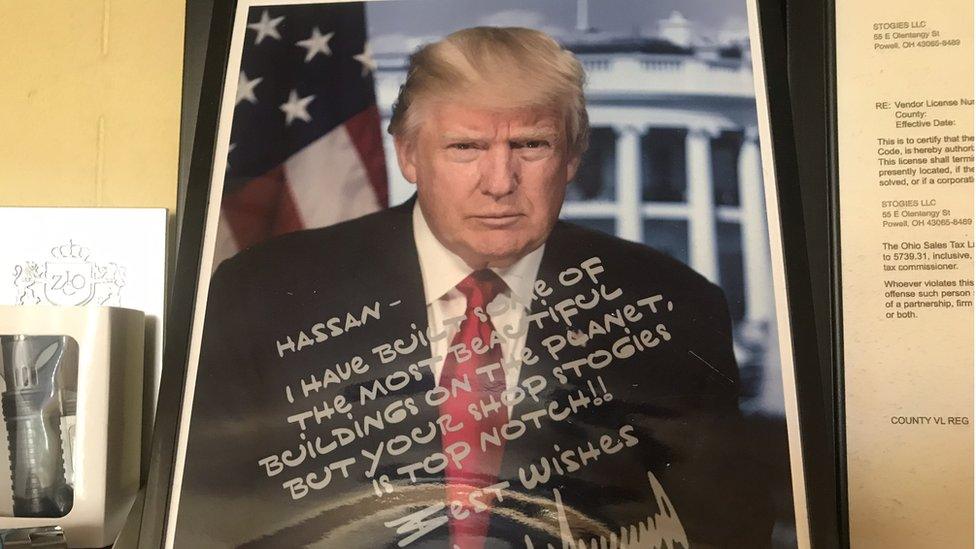
An autographed photo of President Trump in Stogies cigar lounge
Former Ohio governor and 2016 Republican presidential candidate John Kasich - a vocal critic of Mr Trump - thinks Republicans need to eschew Mr Trump's brand of politics going forward.
"It should become a party of ideas," he says. "It's been basically an anti-Democrat party. They don't have any ideas on healthcare, environment or the wealth gap."
The Democrats are not in great shape either, he adds, but Joe Biden might be able to appeal to middle America. "We'll see whether they will do that but Republicans really need to get some ideas otherwise they will wilt away."
However, Donald Trump remains overwhelmingly popular in Ohio and it's clear he will continue exerting influence on the Republican party even after he leaves the White House.
"His performance in 2016 and 2020 suggests that he is the most popular Republican in Ohio in quite a long time, maybe since Ronald Reagan," says Mark Caleb Smith, a professor of political science at the University of Cedarville.
His popularity among his base has allowed President Trump to attack senior party leaders who don't agree with him.
Among them Ohio's governor, Mike DeWine, for not backing his unsubstantiated claims of a rigged election. Mr DeWine, though a supporter of President Trump, was one of the earlier Republicans out of the gate in recognising President-elect Joe Biden's win.
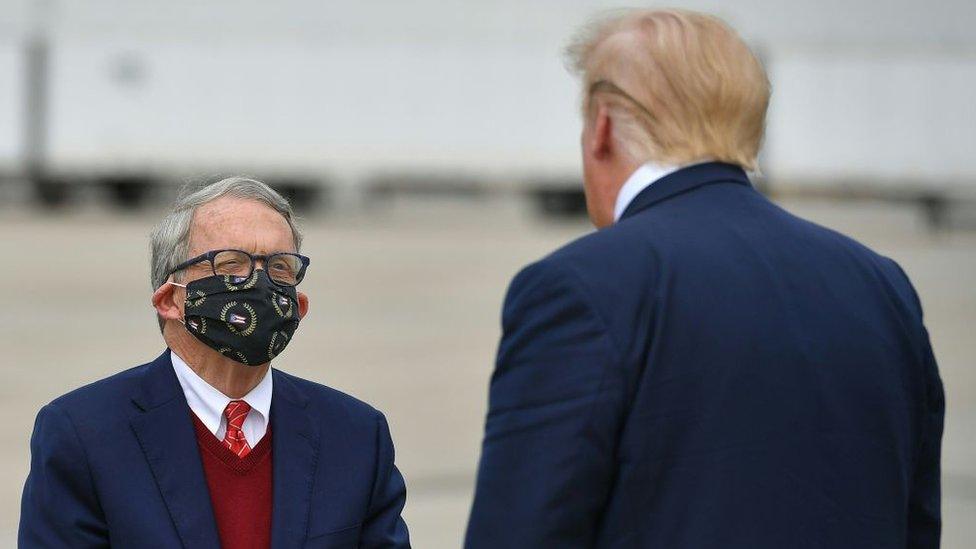
US President Donald Trump has been critical of Ohio Governor Mike DeWine
Emboldened by Mr Trump's attack, some fellow Republicans are even trying to impeach the governor for enforcing measures to curb Covid-19, which is at a record high in the state.
Gov DeWine, who took steps early on to combat the coronavirus and has handled the pandemic very differently to Mr Trump, has hit back at his detractors.
So how can Republican leaders like him deal with hostility from within his own party going forward?
Professor Smith says that keeping the deeply conservative base happy could be key.
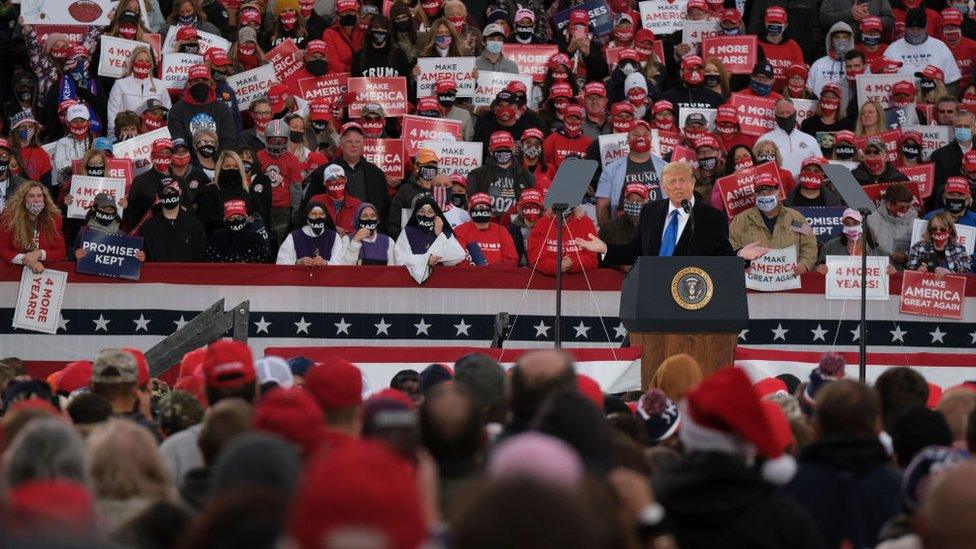
Supporters packed a Trump rally in Ohio in October
"Governor DeWine is willing to sign anti-abortion legislation, for example," he says. "I'd expect that kind of thing to continue."
"His rhetoric on family and marriage will probably ratchet up a bit. Governor DeWine is a staunch Catholic and I would expect him to use that language more frequently about religion and his faith. I think that does quite well with the people who are supportive of the president."
Mr Trump did very well in Ohio in the rural areas outside of major cities such as Cleveland, Columbus and Cincinnati, where the electorate is predominantly white.
However, can the party really sustain itself nationally by focusing on his base?
Studies show that America is getting more diverse and minorities are already a powerful voting bloc, so Republicans will likely need new strategies going ahead.
How are Biden voters in a Trump heartland dealing with the election aftermath?
Republican strategist Terry Casey says the party will look for new ideas but President Trump could potentially leave a lasting legacy.
"He has shifted the party somewhat for the good because the Republican party previously had the image of the party of the country club, and the Wall Street rich people. And now it has shifted to issues of the middle class or the working class and a lot of people in the Midwest who have been forgotten."
Whether Donald Trump continues to remain a powerful presence in Republican politics will be determined in the months to come. But one thing seems certain, both parties need to make sure that middle America - like Ohio - does not feel ignored.
- Published4 December 2020
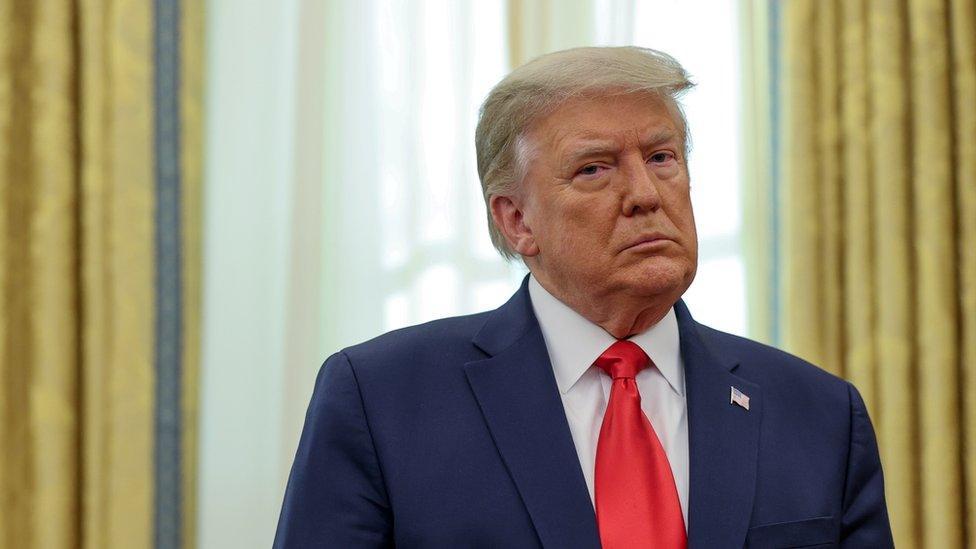
- Published6 December 2020
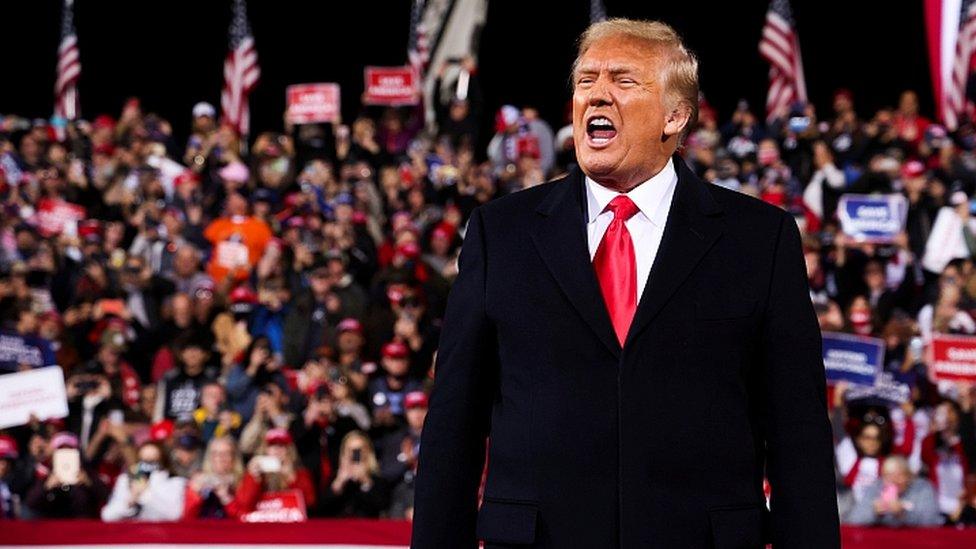
- Published14 December 2020
